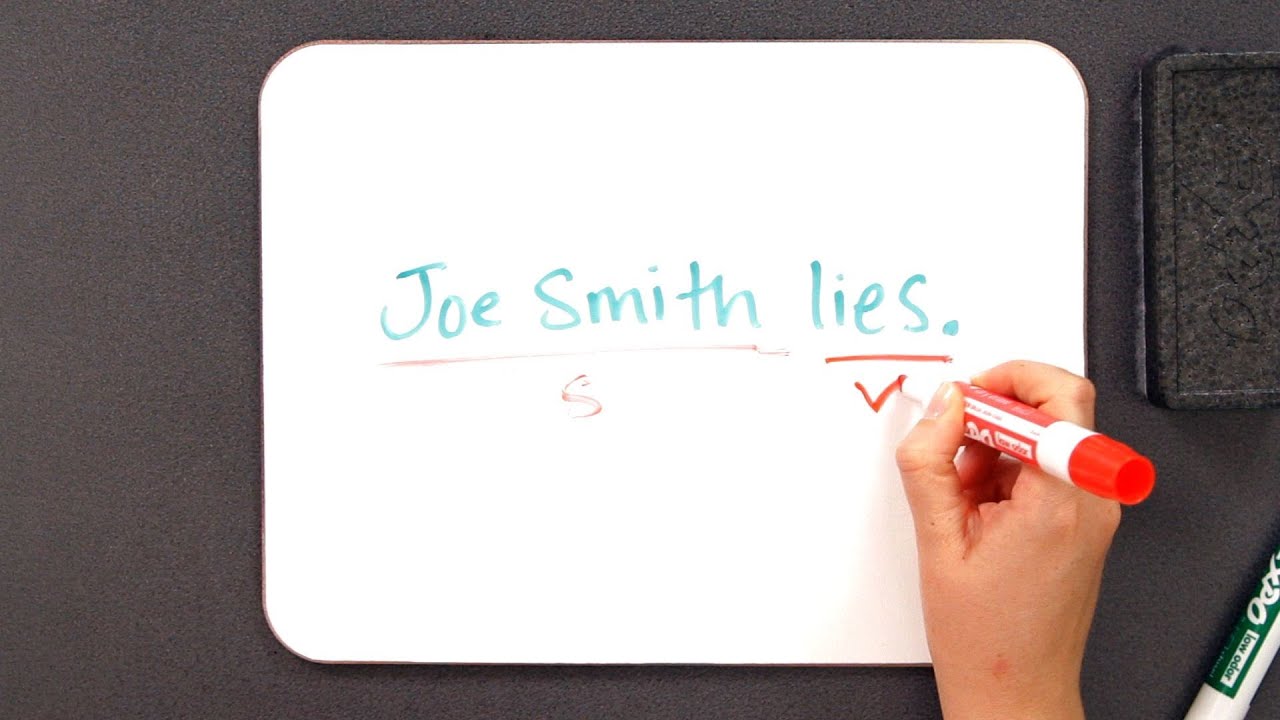How to Write a Complete Sentence | Grammar Lessons
Full Playlist: https://www.youtube.com/playlist?list=PLLALQuK1NDrhq44LEu1DyBEJdGXR7JUne
–
–
Watch more Grammar Lessons videos: http://www.howcast.com/videos/515788-How-to-Write-a-Complete-Sentence-Grammar-Lessons
So all sentences have to follow two rules in order to be a complete sentence. Rule #1 of Sentence Club is the sentence has to have at least one subject and one verb. Rule #2 of sentences is that the sentence has to express a complete thought. So whenever you come across a sentence, run it past those two rules, and if it doesn’t pass one of the rules, it’s not a complete sentence. Let’s give it a try with a couple of examples. OK. So here’s an example of a phrase that may or may not be a sentence. Let’s take a look. It says, “While you are in the library.” Let’s see if it passes the first rule of sentences. Does it have a subject and a verb? It does have a subject, and it has a verb, you and are. OK.
So it passes rule one. Rule two, does it express a complete thought? While you are in the library. It reads more like a cliffhanger. It’s the beginning of a thought, but it’s not the end of the thought, because it doesn’t let us what happens while we’re in the library. So this phrase has not earned the period. It’s not a complete sentence. Let’s take a look at another one. OK. So if a friend asks me what I’m doing. Maybe she sends me a text and says, “What are you up to?” I might respond, “Walking the dog.” It sounds like a complete thought. We know what’s happening.
But it doesn’t pass our first test of sentences, because we have verb, walking, but we don’t know who is doing the walking. We’re missing the subject. The I is implied, but unfortunately, this isn’t a complete sentence. OK. Now here’s a really simple phrase. It says, “Joe Smith lies.” Let’s find out if this is a complete sentence. Do we have a subject? Well, we have Joe Smith. And do we have a verb? We have lies. Now the second rule is do we have a complete thought? Well, yes. “Joe Smith lies” is a complete thought, and so therefore it’s earned the period. It’s a complete sentence. I hope that this gives you a good guide about how to write and identify complete and incomplete sentences.



![[ID: nRNa_HkgYFQ] Youtube Automatic](https://bizimtube.com/wp-content/uploads/2021/03/id-nrnahkgyfq-youtube-automatic-236x133.jpg)
![[ID: nKvpMq-k4VE] Youtube Automatic](https://bizimtube.com/wp-content/uploads/2021/03/id-nkvpmq-k4ve-youtube-automatic-236x133.jpg)
![[ID: yhITUFbi7H8] Youtube Automatic](https://bizimtube.com/wp-content/uploads/2021/03/id-yhitufbi7h8-youtube-automatic-236x133.jpg)
![[ID: 1G3UK4EgsIM] Youtube Automatic](https://bizimtube.com/wp-content/uploads/2021/03/id-1g3uk4egsim-youtube-automatic-236x133.jpg)
![[ID: _zHdzEzAt9o] Youtube Automatic](https://bizimtube.com/wp-content/uploads/2021/03/id-zhdzezat9o-youtube-automatic-236x133.jpg)
![[ID: gqgRajnKkBI] Youtube Automatic](https://bizimtube.com/wp-content/uploads/2021/03/id-gqgrajnkkbi-youtube-automatic-236x133.jpg)
![[ID: 5-3fSrQTBxI] Youtube Automatic](https://bizimtube.com/wp-content/uploads/2021/03/id-5-3fsrqtbxi-youtube-automatic-236x133.jpg)
![[ID: ouCtbSdrkWc] Youtube Automatic](https://bizimtube.com/wp-content/uploads/2021/03/id-ouctbsdrkwc-youtube-automatic-236x133.jpg)
![[ID: MgYLCr1GLO8] Youtube Automatic](https://bizimtube.com/wp-content/uploads/2021/03/id-mgylcr1glo8-youtube-automatic-236x133.jpg)
![[ID: vVCcQJpk2H4] Youtube Automatic](https://bizimtube.com/wp-content/uploads/2021/03/id-vvccqjpk2h4-youtube-automatic-236x133.jpg)
![[ID: hCMKysXAbco] Youtube Automatic](https://bizimtube.com/wp-content/uploads/2021/03/id-hcmkysxabco-youtube-automatic-236x133.jpg)
![[ID: fM9J7p32XCA] Youtube Automatic](https://bizimtube.com/wp-content/uploads/2021/03/id-fm9j7p32xca-youtube-automatic-236x133.jpg)